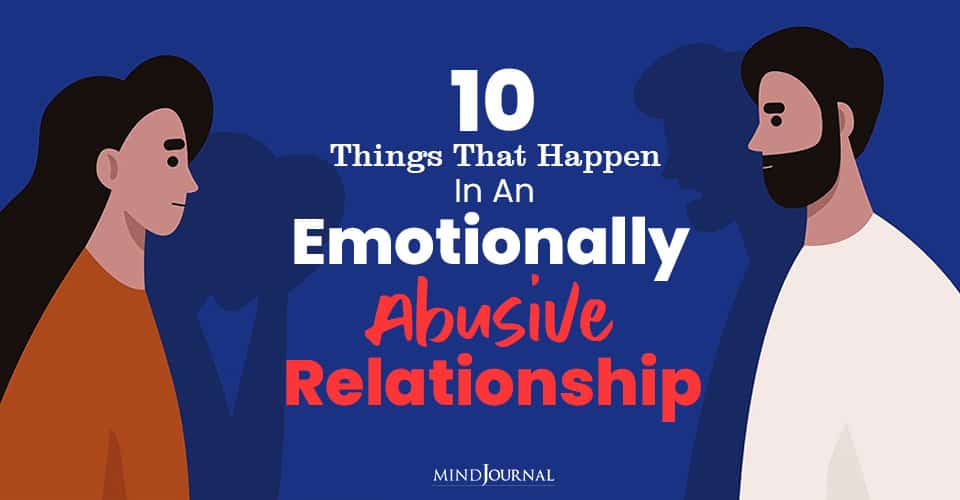Being in an emotionally abusive relationship is like being in hell 24×7, where you are dismissed, insulted, lied to and abused day in and day out. The worst part? You are made to feel that nothing is wrong and you are simply imagining everything.
If you’ve never been involved with a conning, pathological lying, narcissistic, abusive partner, you may not know what you’re dealing with.
When you date an abusive personality, you may buy into his charm, braggadocio, and phony facade while downplaying his inconsiderate and questionable behavior. Or you mistrust your instincts that your boyfriend or husband is lying to you, demeaning and controlling you. Worse yet, you may think you are overreacting and crazy—as he claims you are.
NOTE TO SELF: You can be in an emotionally abusive relationship with a boyfriend or girlfriend, husband or wife, male or female friend, family member, boss or co-worker.
An abuser’s goal is to affect and control the emotions, objective reasoning, and behavior of his victim. Covert abuse is disguised by actions that appear normal, but it is clearly insidious and underhanded.
The abuser methodically chips away at your confidence, perception, and self-worth with his subtle hints, unnecessary lying, blaming, accusing and denial.
The abuser fosters an atmosphere of fear, intimidation, instability, and unpredictability. He steadily pushes you to the edge with his deception, sarcasm, and battering until you erupt in anger and then you become the “bad guy” giving him the ammunition he needs to justify his hurtful actions.
If you are experiencing any of the following 10 things, you’re in an emotionally abusive relationship.

1. Accusing and Blaming.
He shifts the responsibility and the emphasis onto you for the problems in your relationship. He says things, like: “It’s your fault.” What’s wrong with you?” “You didn’t remind me.” “Nothing I do is ever enough.”
2. Withholding.
He refuses to listen, he ignores your questions, he withholds eye contact and he gives you the “silent treatment.” He’s punishing you! He may refuse to give you information about where he is going, when he is coming back, about financial resources and bill payments. He withholds approval, appreciation, affection, information, thoughts, and feelings to diminish and control you.
Related: Eight Mental Abuse Tactics to watch out for
3. Blocking and Diverting.
He steers the conversation by refusing to discuss an issue or he inappropriately interrupts the conversation. He twists your words, he watches TV or he walks out of the room while you’re talking. He criticizes you in a way that causes you to defend yourself and lose sight of the original conversation.
4. Countering.
He disapproves and opposes your thoughts, perceptions, or your experience of life itself. No matter what you say, he uses contradicting arguments to frustrate you and wear you down. If you say, “It’s a beautiful day,” he’ll say, “What’s great about it, the weather’s crappy.” If you say you like sushi, he’ll say, “Are you kidding, it’ll give you parasites.”
5. Discounting.
He denies your experience of his abuse. He tells you that you’re hypersensitive or that you’re imagining things or that you can never be happy. His disfigures the truth, causing you to mistrust your perception and the reality of his abuse.
6. Disparaging Humor.
Verbal abuse is often disguised as jokes. The abuser teases, ridicules, and humiliates you with sarcastic remarks about your appearance, personality, abilities, and values. He makes fun of you in front of your friends and family because he knows you will avoid a public confrontation. If you tell him to stop, he tells you that you are too sensitive or you can’t take a joke.
Related: Verbal Abuse Disguised As Jokes
7. Crazy-Making.
He uses a combination of distortion, blaming, forgetting, stonewalling, and denial to confuse, frustrate, and drive you to the brink of insanity. He denies the truth and twists your words, putting you on the defense. He wants you to second guess yourself, doubt your reality, and your ability to reason.
8. Judging and Criticizing.
He harshly and unfairly criticizes you and then he passes it off as “constructive” criticism. If you object, he tells you he is only trying to help you to make you feel unreasonable and guilty.
9. Undermining.
He breaks his promises and he fails to follow through on agreements. He minimizes your efforts, interests, hobbies, achievements, and concerns. He trivializes your thoughts and suggestions. If you suggest a restaurant or a vacation destination, he says, “The food is awful at that place!” and “Why would you want to go to Florida; it’s nothing but a tourist trap!”
10. Forgetting.
He “accidentally” forgets the things that are important to you. He forgets to pick up the dry cleaning, to make a household repair, or buy tickets to the movies. He is saying, “I’m in control of your time and reality.”
Related: 20 Subtle Signs of Emotional Abuse
Abusive behavior is not always verbal. Your partner may use body language or gestures to control and diminish you. For example:
- Refusing to talk or make eye contact.
- Sulking, strutting, posturing, and stomping out of the room.
- Boredom-crossed arms, showing disgust, rolled eyes, and frowning.
- Inappropriate sounds, deep sighs, words like, “Soooo!”.
- Hitting or kicking something or driving recklessly to scare you.
- Withdrawing or withholding affection to punish you.
- Patronizing, laughing at your opinion, mimicking or smirking.
- Interrupting, ignoring, not listening, refusing to respond.
- Distorting what you say, provoking guilt, or playing the victim.
- Yelling, out-shouting, or swearing to shut you down.
- Starting a sentence with, “Forget it”.
Now that you know the conniving, covert signs of emotional abuse, what are you going to about it?
Written By Nancy Nichols
Originally Published on knowitallnancy.com











Leave a Reply